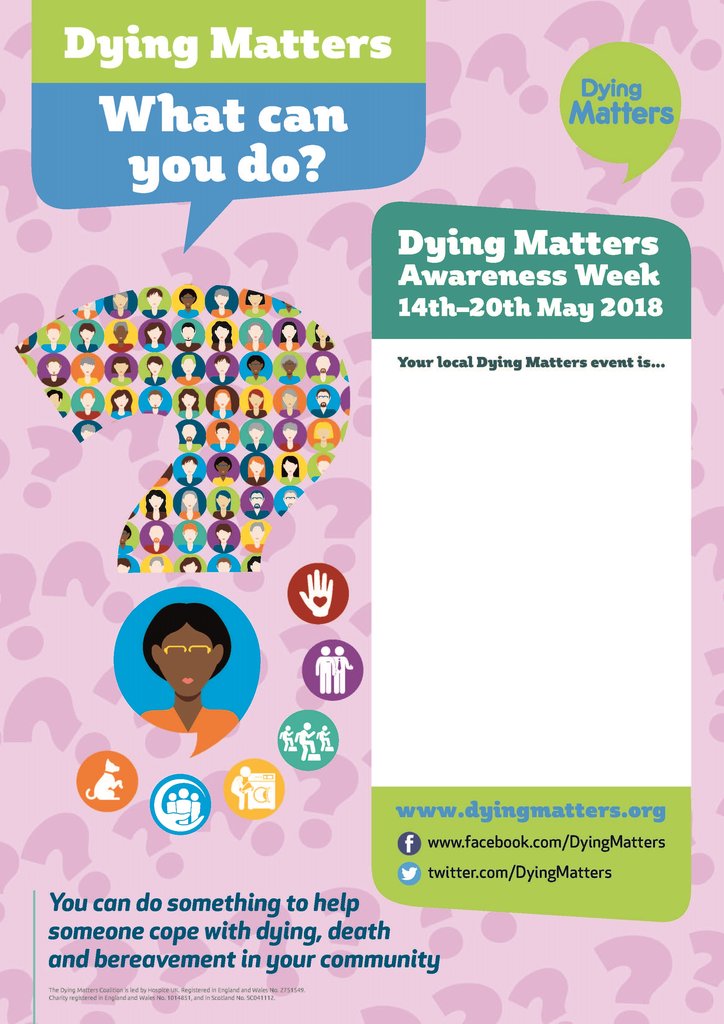NWP Blog
Dying Matters Awareness Week
9 May 2018

Dying Matters Awareness Week
Every year in May, Dying Matters and their coalition members host an Awareness Week, which gives us an unparalleled opportunity to place the importance of talking about dying, death and bereavement firmly on the national agenda. In 2018, the week will run from 14th to the 20th of May and the theme will be asking "What Can You Do... in your community?"
Dying Matters
How can you get involved with Dying Matters Awareness Week?
Sign Up To Newsletter
Order Resources To Support The Campaign
Write A Press Release
Spread The Word On Social Media
Make A Donation To Dying Matters
Follow Dying Matters on Facebook and Twitter to keep up to date
What is Death and Dying?
Death is the one great certainty in life. Some of us will die in ways out of our control, and most of us will be unaware of the moment of death itself. Still, death and dying can be approached in a healthy way. Understanding that people differ in how they think about death and dying, and respecting those differences, can promote a peaceful death. The difference between death and dying is when you experience death there is no coming back, your body and mind are gone forever; however when you are dying this is when you are close to death and are about to die soon.
How do we take action towards death?
The primary course of action when death is near is to fulfill the dying person's wishes. If the person is dying from an illness, ideally, they will have participated in decisions about how to live and die. If the requests made do not seem practical to the caregiver, options should be raised with the dying individual to try to accommodate his or her request and still provide adequate care. If the dying individual has not been able to participate in formulating final plans, you should strive to do what you think this person would want. If the individual is in a hospice, he or she may desire a natural death. In this situation, the aim will be for the final days and moments of life to be guided toward maintaining comfort and reaching a natural death.
What is a Bereavement?
Bereavement sometimes also referred to as grief, is a term used to describe the sense of loss felt when a loved one passes away. This sense of loss may contain a host of emotions, such as sadness, anger, guilt and/or frustration and anxiety, and the period immediately following the death is often referred to as the mourning period. People who are acutely bereaved or grieving may also be described as “in mourning” for the deceased.
Coping With Bereavement
Talking and sharing your feelings with someone can help. Don't go through this alone. For some people, relying on family and friends is the best way to cope. If you don't feel you can talk to them much – perhaps you aren't close, or they're grieving, too – you can contact local bereavement services through:
- your local hospice
- the national Cruse helpline on 0808 808 1677
- your GP
Top Tips On Dealing With Bereavement
- Express yourself. Talking is often a good way to soothe painful emotions. Talking to a friend, family member, health professional or counsellor can begin the healing process.
- Exercise as this will keep you occupied and allow you to remain healthier better for your wellbeing
- Allow yourself to feel sad. It's a healthy part of the grieving process.
- Keep your routine up. Keeping up simple things like walking the dog can help.
- Sleep. Emotional strain can make you very tired. If you're having trouble sleeping, see your GP.
- Eat healthily. A healthy, well-balanced diet will help you cope.
- Avoid things that "numb" the pain, such as alcohol. It will make you feel worse once the numbness wears off.
- Go to counselling if it feels right for you – but perhaps not straight away. Counselling may be more useful after a couple of weeks or months. Only you will know when you're ready.


 TRUST
TRUST
Post Comments